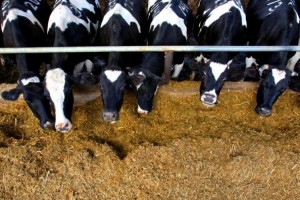By ANDREA FOX - BusinessDay.co.nz
Fonterra says it is having a "very close look" at relaunching a processing business in China as it faces a rapidly growing competitive threat from Chinese manufacturing startups with their own large-scale dairy farms.
Fonterra China managing director Philip Turner, in an exclusive interview with BusinessDay, says New Zealand's dairy giant is considering several options for redeveloping processing capability after its disastrous joint venture foray with Chinese dairy company SanLu, which collapsed after being implicated in the 2008 melamine baby poisoning scandal.
Fonterra believes it has the highest-quality milk in China right now, Mr Turner says.
Its 35-hectare pilot dairy farm in Hebei province has just finished its third year, having produced more than 25,000 tonnes of milk from its 6000 cow-herd, and is performing well ahead of budgeted revenues and profit, he says, while declining to share those figures.
A deal to lease about 40ha in Hubei province for a second farm with 3000 milking cows is a couple of weeks off, and a third startup farm also in Hebei, won't be far behind.
But while Fonterra's venture to provide safe, quality milk to a country plagued by food safety scares has proved more lucrative than expected, Mr Turner is worried about competition.
"It won't be from foreign companies, it will be from big Chinese companies ... We are ahead of the pack but the pack is building quickly."
A lot of foreign private equity money is also pouring into the Chinese dairy industry, Mr Turner says.
He won't be drawn on just how close Fonterra is to making a move to manufacturing, but rules out commodities production and suggests Hebei province is the logical re-entry point because its big customers and milk supply are there.
"We are not looking at big wholemilk powder driers. It would be high-paying customer ingredients. There's a variety of processing applications that could be interesting to us, some could be quite small."
These could include cream, fresh premium milk, and yoghurt production, Mr Turner suggests. Milk needs for these products could be met by Fonterra's own farms – directors have approved only two farms but planning is for a cluster of four to six in Hebei with up to 30,000 cows. Then there's the prospect of nutritional ingredients production such as infant formula.
But the experience of the SanLu debacle is still raw. Having control of milk quality and safety from the cow's udder to packaging would be "paramount". That would be achieved by fully controlling the operational side of any venture, but not necessarily the boardroom, Mr Turner suggests.
Fonterra had three representatives on the SanLu board. They claimed to have been kept in the dark about parents' complaints to the Chinese company that their children were getting sick after drinking SanLu infant formula.
Pressed on the likely governance structure of future ventures, Mr Turner says control is separate from ownership. "There are a number of ways of structuring this to ensure we have operational control, which we did not have in SanLu. It does not mean we have to have major shareholder control.
"It was a terrible tragedy and made us highly cautious about what we do next. There's been a lot of internal reflection on it. Let's leave it at that."
Demand in China in the next two years will be strong, Mr Turner says. "We could sit back and just sell into the local market, or we could establish long-term contractual arrangements,or process ourselves, or do a combination of all of these."
Fonterra's aim is to lead the high-value dairy market in China.
The milk price in China is one of the highest in the world but its quality is a potential hazard until Fonterra has a steady supply of safe milk whose production it can control from behind the farmgate to the packaging stage, Mr Turner says.
"Clearly a high quality milk source is fundamental to being able to grow with our customers.
"While imports are growing strongly, China secures 90 per cent of its milk requirements from local production. And our customers are keen to have local sourcing opportunities because stuff can go wrong at the borders, and it takes a long time to get product from New Zealand. They need supply-chain flexibility and to be able to restock quickly. We want to have quality milk locally to complement and supplement the local supply."
But Fonterra and its customers don't trust "most of the milk we see being produced in China", Mr Turner says. Which is where the farm-expansion strategy comes in.
Land cannot be owned in China – it belongs to the people – so Fonterra will again lease and rent its next two farms. Leases are for 50 years, renting contracts for a shorter period. The search has taken many months because of legal designation com-plexities, Mr Turner says.
"The government is concerned about feeding its population. It wants millions of hectares of land maintained as cropland to feed people and is being increasingly tough at local level about holding back the encroachment of cities and industrial users. A dairy farm is currently viewed as an industrial use rather than agricultural, which makes things tricky."
As the pace of dairying competition in China speeds up, so too does the authorities' response to food-safety scares which are under-mining consumer confidence in dairy products, Mr Turner says.
"Increasingly the regulations are getting tighter. We are seeing well-drafted world-quality regulations being put in place by the Ministry of Health with regard to food safety or milk collection and processing."
Enforcing the regulations is another matter.













